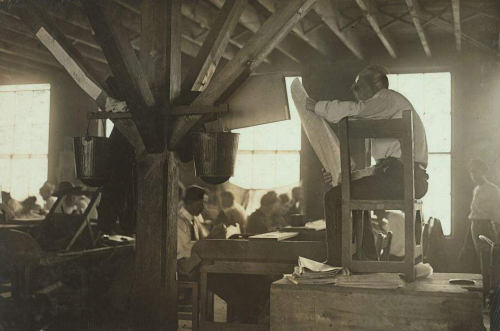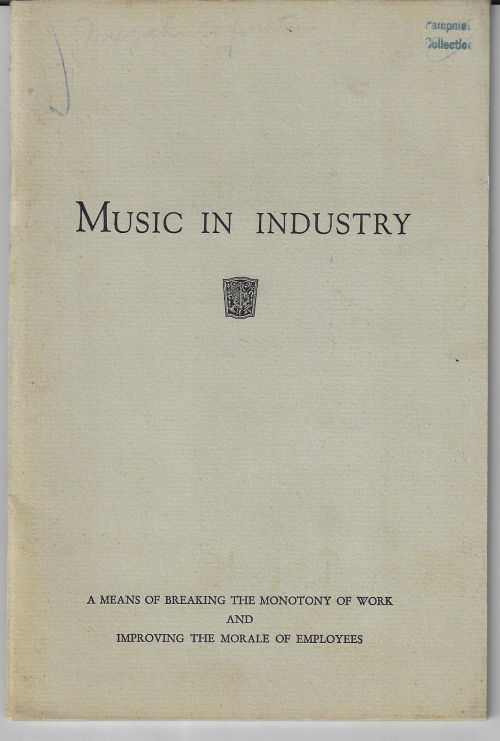JF Ptak Science Books Quick Post
 Entertaining works for a happier labor force has certainly been a "thing" for quite some time--I don't know the history very much1 but I know it extends back into the 19th c to some probably very small degree, and I do recall a Lewis Hine photo of a Lectore in Havana reading to cigar rollers (in 1909). It makes sense to make your workers comfortable and to work to end intellectual monotony, though few employers proceeded that way.
Entertaining works for a happier labor force has certainly been a "thing" for quite some time--I don't know the history very much1 but I know it extends back into the 19th c to some probably very small degree, and I do recall a Lewis Hine photo of a Lectore in Havana reading to cigar rollers (in 1909). It makes sense to make your workers comfortable and to work to end intellectual monotony, though few employers proceeded that way.
And thus to Muzak, the improbable source of injecting music into the cooperation equation of industrial control of workers. [Source: via the Library of Congress]
 I came to this quick realization--late to me--after finding a pamphlet in the warehouse, Music in Industry as a Means of Breaking the Monotony of Work and Improving the Morale of Workers. It was published in 1941--which is earlier than I expected for the Muzak Corporation--which adds to the surprise of the scope of the company's long-lived impact, its history stretching back to the early 1930's. It seems as though Muzak, which has a somewhat complex ownership and control history over its first 15 years or so, was a significant contributor to the sound landscape in the United States. It provided four different broadcasting "networks" of selected musical patterns from the early days of wireless broadcast (at about a dollar a day per month) that provided a certain sort of architecture/design of a sound wall, though the music at this point was coming over telephone lines. In any event, Muzak started providing massive amounts of music into public and private spaces for some time, and their position was accelerated after the company's war effort during WWII, and then becoming involved in U.S. post-war propaganda programs, and then into the Muzak that we think of today...all of which was happening a few decades before I thought it did. The fact is though that Muzak was filling silence in a controlling way in work and public places for a very long time. I imagine that one could think of this as a sort of early robotization of the human workforce--that is extreme, of course, but the thought worked its way through my head and came out here.
I came to this quick realization--late to me--after finding a pamphlet in the warehouse, Music in Industry as a Means of Breaking the Monotony of Work and Improving the Morale of Workers. It was published in 1941--which is earlier than I expected for the Muzak Corporation--which adds to the surprise of the scope of the company's long-lived impact, its history stretching back to the early 1930's. It seems as though Muzak, which has a somewhat complex ownership and control history over its first 15 years or so, was a significant contributor to the sound landscape in the United States. It provided four different broadcasting "networks" of selected musical patterns from the early days of wireless broadcast (at about a dollar a day per month) that provided a certain sort of architecture/design of a sound wall, though the music at this point was coming over telephone lines. In any event, Muzak started providing massive amounts of music into public and private spaces for some time, and their position was accelerated after the company's war effort during WWII, and then becoming involved in U.S. post-war propaganda programs, and then into the Muzak that we think of today...all of which was happening a few decades before I thought it did. The fact is though that Muzak was filling silence in a controlling way in work and public places for a very long time. I imagine that one could think of this as a sort of early robotization of the human workforce--that is extreme, of course, but the thought worked its way through my head and came out here.
Notes:
- I don't think I've ever mentioned this in the 4500-odd posts I've made to this blog in the last nine years, but the one rule I try to abide in writing one of these posts is that they take no more than an hour, start-to-finish.
- For an interesting read, see Elevator Music: A Surreal History of Muzak, Easy-Listening, and Other, by Joseph Lanza.
- There are no copies of this work found in WorldCat/OCLC, in spite of this being the second printing of the pamphlet. There are several other works by this title--generally being journal articles) and even a music in industry bibliography published in 1943, but no listings for the Muzak title.


John,
William Paley CBS was a reader in his families Cuban cigar factory see his entry in wikipedia as to what that lead to.
JT
Posted by: John Thomson | 05 June 2017 at 07:06 PM